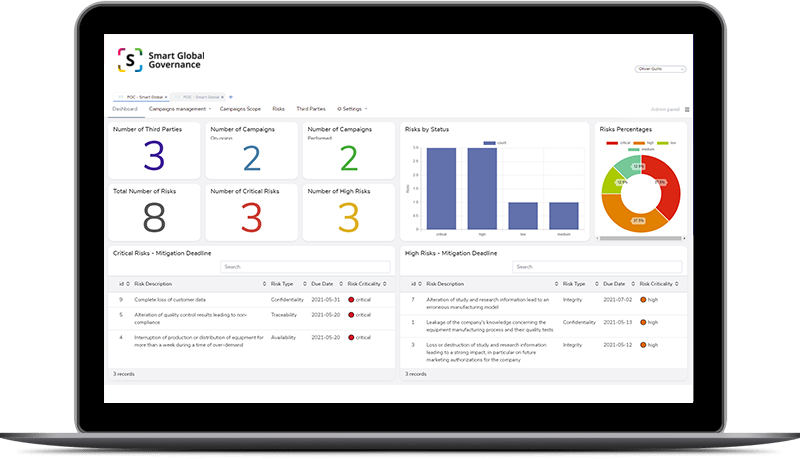
Découvrez nos solutions sans obligation d’achat
In this article we will discuss what internal auditors do, the difference between conducting a successful internal audit and the internal audits an organization can conduct. ISA 610 deals with the interaction between external and internal auditors in conducting internal and external audits and is revised to take account of changes in practice in the interaction between external and internal auditors and changes in the requirements of the Internal Audit Act in working with internal auditors. [Sources: 9,12,5]
Internal Audit refers to the ongoing audit tasks performed by a separate internal audit department within an organisation. Internal audit is for employees of a unit and is performed by internal audit and not by external auditors or other employees. [Sources: 18,16]
External auditors are independent external auditors, usually employed by companies with industry knowledge that recognise competence in external auditing. They are not employees of the company to be audited, but are part of an organisation’s internal auditor, who is responsible for the audit and reports to management. The agenda for external and internal audits is set by the examiner, who arranges the audits. [Sources: 8,21,8]
The scope of an internal audit is determined by the company’s management, while the scope of an external audit must be determined by the relevant laws and regulatory authorities. The scope of internal audits may also be determined in connection with the business of a company, as well as by a relevant law or regulatory authority that determines the scope of external audits. In addition, the scope of internal audit can be determined by the management of the companies, while the scope of external audit can be determined by local laws or regulatory authorities, such as the Code of Conduct for internal audits. [Sources: 11,11]
Although an external audit receives a certain audit fee, which is normally based on the audit mandate, internal audits are carried out by company employees, who are usually paid a monthly salary. Although they are internal auditors, external auditors are external contractors and not employees of the organization. Their independence is not affected as long as it is carried out by the internal audit department of the company or by a third party company, regardless of the size of the organisation, and their independence cannot be affected in the event of a conflict of interest. [Sources: 11,14,13]
Separately, internal auditors are guided by a set of rules and regulations that they must comply with. In order to comply with these obligations, the external auditor typically inquires about the planned internal audit activities. The procedures followed by the internal auditor in these areas provide the auditor with useful information, whether for checking, evaluating or monitoring the controls. [Sources: 4,15,22,2]
External auditors can also choose to use their comprehensive understanding of the internal audit process. The internal auditor, on the other hand, can learn from the superior expertise of an external auditor and implement best practices in internal auditing. This opens many doors for external auditors who can participate in technology audits, should they now decide to take the leap to internal audits at a later date. [Sources: 0,11,6]
Internal audits are usually carried out by company employees, but if you are concerned about the time and personnel required for internal auditing and an initial risk assessment, you should consider hiring an independent accountant or auditor. On the other hand, an external audit is an audit carried out by independent agencies or companies that have no connection to your company. An external audit: An independent person or agency that conducts external audits enables the recruitment of independent internal auditors for internal audits as well as external audits. [Sources: 3,17,19,11]
However, internal audit activities are sometimes outsourced to external auditors and consultants who have the technical skills and resources, such as audit firms. [Sources: 16]
Another way to ask this question would be to say that external auditors can outsource some of the internal audit tasks without compromising independence. Consider the non-audit performance of an external auditor, which could undermine the quality of the external audit. [Sources: 7,13]
It would be appropriate to broaden the scope of the ISA so that external auditors should use the work of an internal auditor to include considerations on how the internal and external auditors should cooperate in the conduct of the audit. Depending on the size of your organization, some internal audit functions can be outsourced or performed by your company’s internal audit department. It is important to clarify the extent to which external auditing can work and to respond with clearly defined rules. [Sources: 12,13,20]
Your company’s management must understand the company’s requirements and decide accordingly whether it needs internal or external auditing. External examiners should inform the designated university representatives of any errors, deviations, exam questions or concerns that may arise during the exam process. [Sources: 1,10]
External auditors must assess the evidence they receive in carrying out their work and try to provide a presentation that shows the true and fair view. Since internal audit is part of the system of risk management and internal controls, many of which are not subject to the general accounting system, external audit seeks to produce an accounting system that is true, fair and in-view of all. While external auditors typically do not include such proposals (except in specific cases), internal audits may involve the use of external experts to make recommendations for changes to internal accounting systems and / or internal control systems. To gain an understanding of the functions of internal audit during the audit planning phase, SAS 65 allows an external auditor to use the planned internal audit program or to seek direct assistance from an internal auditor. [Sources: 5,14,11,22]
Sources:
[0]: https://quantivate.com/blog/internal-external-audit-comparison/
[1]: https://www.jaxaauditors.com/blog/difference-between-internal-audit-and-external-audit
[2]: https://pcaobus.org/oversight/standards/archived-standards/pre-reorganized-auditing-standards-interpretations/details/AU322
[3]: https://www.wipfli.com/insights/articles/ra-internal-audit-or-external-audit-which-is-better
[4]: https://www.stabroeknews.com/2020/06/14/sunday/the-two-sides-of-auditing-internal-and-external/
[5]: https://www.abacademies.org/articles/the-extent-of-external-auditor-relaying-on-internal-auditor-work-under-erp-continuous-auditing-the-case-of-jordan-9111.html
[6]: https://www.barclaysimpson.us/blogs/5-benefits-of-moving-from-external-audit-to-internal-audit-02929112327
[7]: https://www.iia.org.uk/resources/delivering-internal-audit/position-paper-internal-audits-relationship-with-external-audit/
[8]: https://www.topaccountingdegrees.org/faq/what-is-the-difference-between-an-internal-and-external-auditor/
[9]: https://hyperproof.io/resource/internal-audits-how-to-conduct-one/
[10]: https://fa.uw.edu/audit/content/liaison
[11]: http://www.differencebetween.net/business/finance-business-2/difference-between-internal-audit-and-external-audit/
[12]: https://www.iaasb.org/projects/using-work-internal-auditors
[13]: https://www.sec.gov/rules/proposed/s74902/wgbishop1.htm
[14]: http://accounting-financial-tax.com/2008/08/differences-and-similarities-of-internal-auditor-v-external-auditor/
[15]: https://businessdegrees.uab.edu/blog/internal-auditing-vs-external-auditing/
[16]: https://www.wikiaccounting.com/similarity-differentiation-internal-audit-external-audit/
[17]: https://www.elmens.com/business/key-differences-between-internal-and-external-audits/
[18]: https://keydifferences.com/difference-between-internal-audit-and-external-audit.html
[19]: https://smallbusiness.chron.com/importance-external-audit-17630.html
[20]: https://floqast.com/blog/internal-audit-vs-external-audit-whats-the-difference/
[21]: https://en.wikipedia.org/wiki/External_auditor
[22]: https://go.gale.com/ps/i.do?id=GALE%7CA57476555&sid=googleScholar&v=2.1&it=r&linkaccess=abs&issn=00205745&p=AONE&sw=w